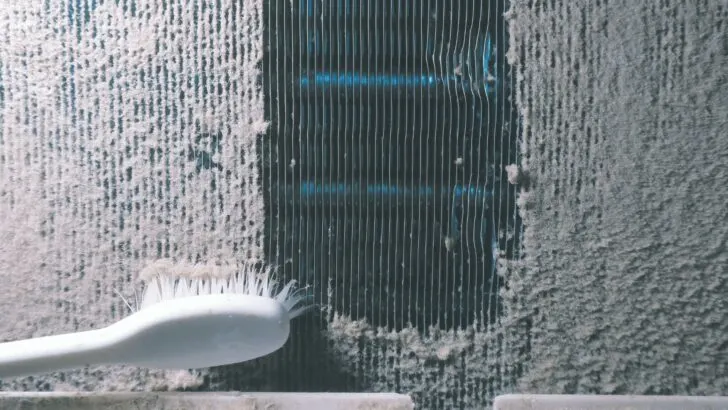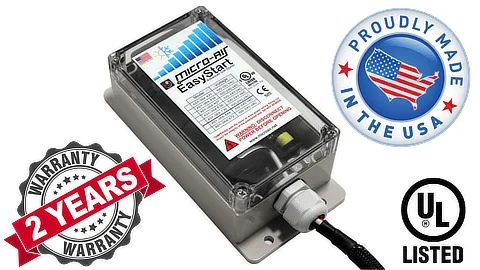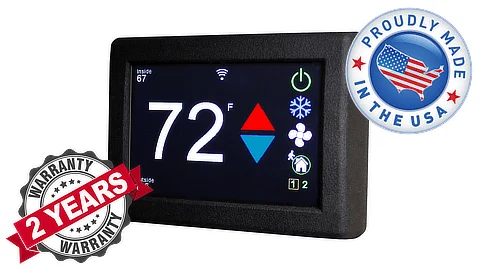Hot air and high humidity are a terrible combination. It’s the job of your air conditioner to cool the air and control humidity to some degree. But if your AC unit can’t get the job done, it may be because your RV AC is freezing up. What horrible timing!
An RV AC freeze-up is never a good thing, but with the oppressive heat and humidity we’re having as we write this post, we want to give our readers some ideas about how to address the issue should it occur.
So, as the dog days of summer roll along, let’s talk about the dreaded RV air conditioner freeze-up and see what can be done to correct it!
What Does It Mean For RV AC to Freeze Up?
Air conditioning works by taking the warm, humid air from a room (or vehicle) and circulating it past a surface (the evaporator coil) where heat is removed and the humidity/moisture condenses. The cooled air is blown back into the room and the moisture is caught and directed out of the air conditioner (either onto your RV’s roof or through a drain system).
If something goes wrong, the moisture condensing from the interior air can end up freezing on the evaporator coil, ironically reducing its ability to cool the air that passes over it and causing the inside of your RV to warm up.
What Causes an RV AC to Freeze Up?
There are a number of reasons why your RV’s air conditioner unit might freeze up, most of which are related to airflow. So, let’s take a look at the most common reasons why RV AC units freeze up, how to resolve the problem, and how to make AC freeze-ups less likely.
Dirty Evaporator and Condenser Coils
As we noted in our post on RV AC maintenance as well as in our post on what to do if your RV AC is not cooling, it’s very important to keep the evaporator fins and condenser coils clean.
Not only can dirty evaporator and/or condenser coils cause your RV AC to cool poorly, but they can also contribute to your RV AC freezing up. Lack of proper airflow results in reduced cooling performance and causes the AC to run longer and/or more frequently, which can lead to a freeze-up.

Dirty evaporator fins are a very common cause of RV AC freeze-ups. Keeping these fins clean using a soft toothbrush or a special fin comb and some evaporator cleaning solution will prevent this common cause of RV AC units freezing.
For instructions on how to clean the coils and evaporator, see the posts linked above.
You may want to pick up a special fin comb and brush, and some  or No products found. to have on hand for this purpose.
or No products found. to have on hand for this purpose.
- Heating & AC Fin Comb
- Package Dimensions: 1.778 L x 22.86H x8.382W(centimeters)
Dirty Air Filters
Dirty air filters are a very common reason for decreased airflow in AC units, which can cause your RV AC to freeze up.
Some air filters are disposable and must be replaced with new filters, while others are washable. Regardless, it’s important to keep your AC air filters clean, especially during your traveling season. Be sure to remove your air filter(s) at least once a month (more during pollen season or if you travel in dusty areas) and clean them well or replace them.

You’d be surprised how quickly RV AC filters get dirty and stop the airflow! This common cause of RV AC freeze-ups can be easily avoided by keeping your filter clean.
To clean an AC air filter, you can use water and a mild laundry detergent (like Woolite), but vinegar is also a great option as it can help to address any mold or mildew that may have built up.
If RV isn’t going to be in use for a day or two, soak your AC air filter(s) in a solution of vinegar and water for about 15-20 minutes and then allow them to dry overnight. (Just note that you never want to use bleach as it can damage the filters.)
Once cleaned, rinse the filter thoroughly in clean water and allow it to dry completely before returning it to the AC housing.
If you regularly maintain your AC air filters (or if you need to clean them quickly in a pinch), you can also use a small vacuum or soft brush (like soft toothbrush) to remove the majority of the dust they’ve accumulated. Just be sure to do a complete cleaning when you can.
Poorly Sealed (or Misaligned) Baffle
Another reason proper air flow can be impeded is if the unit’s baffle (sometimes referred to as a flow divider) isn’t well sealed or properly positioned.
The job of a baffle (flow divider) is to keep the hot inlet air separate from the cold air. If poorly sealed or positioned, the baffle may allow the cold air to mix with the hot air. This can cause the now already-cold air coming into the AC unit to form ice when your AC unit tries to further cool it.
This is easy to address by simply resealing the baffle (after first repositioning it if necessary) using a good foil tape.
- 2 INCH BY 70 Yards - 33% MORE THAN THE COMPETITION! - Made in a Beautiful Silver Metal Finish.
- INCREDIBLY RESISTANT - Easily Resists Moisture, UV Rays, Flames, Chemicals, and Performs well in any type of Weather!
High Humidity
Conditions of weather are out of our control for the most part. But, as this summer of 2022 is signaling, conditions of high humidity are getting more and more difficult to avoid.
Humidity can cause an RV air conditioner freeze up because when it cools the air the humidity condenses. So, when the humidity in the air is high, your AC has to work very hard to keep up with the task. Having to cool the air in conditions of very high humidity can overwhelm the AC and lead to the water/condensation freezing on the coils.
So, what’s an RVer to do if high humidity is causing the AC unit to freeze up? You can start by running your fan on high when the humidity is high. This will make it less likely that the moisture has time to freeze on the coils (running your AC’s fan on low can actually contribute to this problem).
You can also open your roof vent fans for a short period of time (maybe 20 minutes or so) to allow moisture and any hot air to escape the RV.
And finally, if you tend to be in high humidity areas, it may be helpful to run a separate dehumidifier (check out our post on the best RV dehumidifiers for some recommendations). We’ll link to products offering three different levels of dehumidification here, but we encourage you to check out our post before buying:
- DampRid Hi-Capacity Moisture Absorber Bucket attracts and traps excess moisture, eliminating musty odors from damp areas.
- The hi-capacity design features a unique Moisture Lock spill resistor technology with a sealed safety cover for a mess free solution.
- ➤【HIGH EFFICIENT DEHUMIDIFICATION】SEAVON portable dehumidifier with 35oz(1000ml) capacity tank extracts up to 16oz(450ml) of water daily in a...
- ➤【COLORFUL NIGHT LIGHTS & AUTO SHUT OFF】Our electric dehumidifier has 7 changing lights (which could be set steady), this bedroom dehumidifier...
- PROFESSIONAL AND EFFICIENT DEHUMIDIFICATION- With removal capacity of up to 32.7 Pints (under 95°F,90%RH condition) of moisture per day. (Please...
- CONVENIENT AND SIMPLE TO USE. Home appliances never need to be complicated. It features a light-touch intelligent control panel, which let you see the...
Low Refrigerant/Coolant
Finally, if the level of refrigerant in your RV’s air conditioner is low, it has to expand more in the evaporator coil. More expansion causes a lower temperature inside the unit that can freeze any moisture onto the coils.
If this is what’s happening to your RV’s AC unit, there’s probably a refrigerant leak somewhere in the system and you should have it looked at by a professional.
How to Defrost an RV AC
If your RV AC is frozen, you can follow these steps to defrost the unit.
- Remove the AC Cover on the Inside of the RV.
- Place a bucket under the AC unit inside the RV to catch residual water as the ice melts.
- Turn the AC unit on the FAN feature (no cooling). Turn the fan up to the highest setting. This should slowly melt the ice, though it could take a few hours or more.
- Allow the AC unit to dry overnight with the bucket or a towel under the unit inside the RV to catch any dripping that may occur.
We hope this is helpful to anyone who experiences or wishes to avoid their RV AC freezing up!
If your issue with your RV’s air conditioner is less about freezing and more about starting and running, have a look at our posts on a fantastic soft start for RV AC units, and its companion Micro-Air Easy Touch RV thermostat.
We’ve got discount codes for both products to save you some cash.
Run your A/C from a small, portable generator OR run two A/C units on a 30-amp connection. By reducing the start-up current needed to get your A/C compressor running, the EasyStart 364 keeps you...Show More
Run your A/C from a small, portable generator OR run two A/C units on a 30-amp connection. By reducing the start-up current needed to get your A/C compressor running, the EasyStart 364 keeps you cool!
Watch our EasyStart installation video
Get $25 off each Micro-Air EasyStart 364 you buy factory direct using the code listed here.
Show LessLooking to add some "smart home" features to your RV? How about a new color touchscreen, programmable thermostat? Even better, how about one that allows you to control it (even remotely) using a...Show More
Looking to add some "smart home" features to your RV? How about a new color touchscreen, programmable thermostat? Even better, how about one that allows you to control it (even remotely) using a smartphone or tablet? That's what the Micro-Air Easy Touch RV thermostat does.
Save $15 on each EasyTouch RV Thermostat when you buy direct from Micro-Air.
Show LessGeek Out with Us Every Week
Join our newsletter to learn about all things RV-related. Every week we offer free tips, tricks, product reviews, and more to our online community of RVers. So, whether this is your first time on the road or you’re a seasoned expert, we’d love for you to geek out with us!









Neal Davis
Friday 18th of August 2023
Thank you, Peter and John! Hey, we plan to take Newton the New Aire to Alaska, probably next summer or the following one. Would it be possible, acceptable, not-creepy if our return-route from Alaska brought us in proximity to you (somewhere BC?) In order to meet? If so, or no you can reply to my email address. Thanks!
TheRVgeeks
Friday 18th of August 2023
Hey Neal! Taking a New Aire to Alaska sounds like an awesome time! Have a blast. We're not in BC all the time, but if we are, happy to connect if we're along your route. Drop us a note when the time comes to see if we're around (usually in the Lower Mainland). Have fun planning your adventure!
Jon Eisenberg
Friday 19th of August 2022
From my experience and all the comments I have read on social media, I believe most AC freezing happens because people try to cool the RV too fast, especially when it’s very humid. What works best is if the RV is at 86°, set the thermostat to 85° and let it run for 10–15 minutes. If the compressor does not cycle off, turn the AC off and set the thermostat to high fan. The warm air blowing through the AC will met off any freeze build-up. Ten minutes later check the temperature in the room and set the thermostat to 2° below that and run the AC again. Once the compressor starts cycling on and off, it’s best to have the fan set on high (rather than auto) so that whenever the compressor is off the fan keeps running to melt off the built-up ice. Just cooling the room 1-2° already makes it much more comfortable and strips out much of the humidity. Once the indoor humidity is knocked down, you can start running the AC normally and it should cycle on and off no problem.
Bob R
Friday 18th of August 2023
@Jon Eisenberg, Running the fan after a shut down only reintroduces the moisture captured on the coil back into the coach and raises the humidity even further. If the system is operating properly (clean coils, clean filters, full refrigerant charge, clean fan/blower blades, baffles sealed, there should be no issue with a continuous run to set temp. Now, if cooling capacity in not sufficient (a units under sized, very high temps, etc), in daylight/sun hours, the coach may never cool to a low set point until the external,heat load (sun) diminishes. Also very hot external ambient temps (+95) will not allow enough heat transfer to the outside. Remember, ACs don’t make cold, they transfer heat….
Mark
Friday 19th of August 2022
@Jon Eisenberg, under normal conditions the indoor (Evap coil ) is prox 40 degrees. No freeze ups should occur during normal cycling ( indoor temps above 70 degrees. Regardless of cycle time .